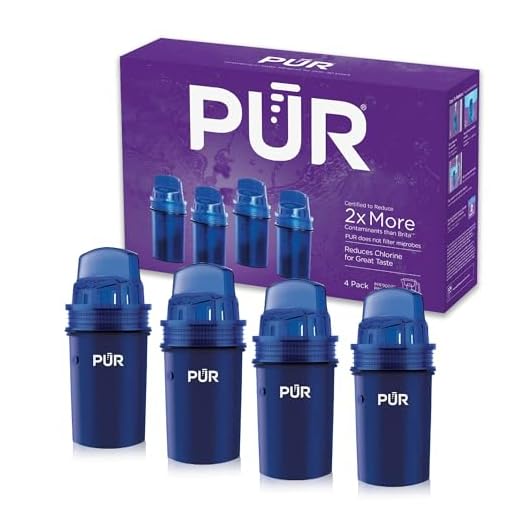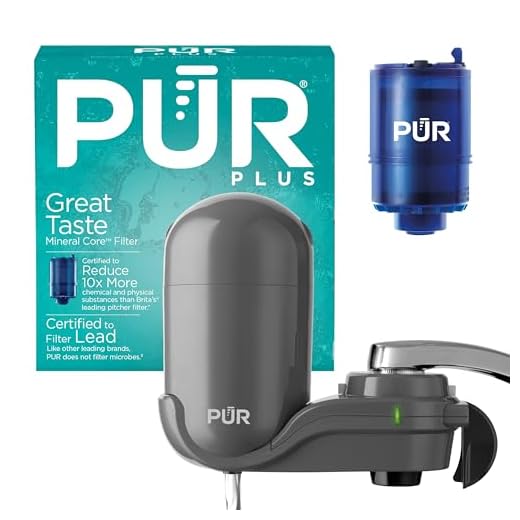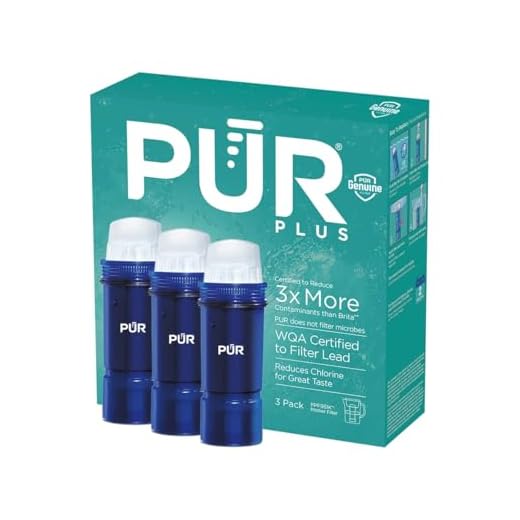




Contaminants Removal
Brita filters primarily use activated carbon and ion exchange resin to reduce contaminants commonly found in tap water. These filters are generally effective at removing chlorine, which can affect taste and odor. Additionally, they target certain heavy metals like lead and mercury, making them a popular choice for households concerned about water quality. However, while Brita filters excel in improving taste, they may not remove all contaminants to the same extent as other brands.
Pur filters offer a broader range of contaminant removal. Their system also features activated carbon but incorporates a patented mineral core that enhances filtration capabilities. This effectively tackles a wider array of pollutants, including pesticides and industrial chemicals. Pur is often certified to remove up to 99% of lead and other particulates, addressing more serious water quality concerns. The choice between Brita and Pur may ultimately depend on specific filtering needs and water quality challenges faced by consumers.
Effectiveness of Pur Filters
Pur filters are designed to target a wide range of contaminants commonly found in tap water. These systems utilize advanced filtration technology, which includes activated carbon and ion exchange, to reduce lead, chlorine, and other impurities. As a result, many users report noticeable improvements in both the taste and quality of their drinking water. The filters are also effective in addressing specific issues like sediment and odor, offering a comprehensive solution for households concerned about water safety.
In addition to their contaminant removal capabilities, Pur filters have undergone rigorous testing and certification from various governing bodies. This ensures they meet specific standards for efficacy and reliability. Users can access detailed information about the performance of each filter model, backed by user reviews and third-party studies. This transparency allows consumers to make informed choices about water purification options that best fit their needs.
Price and Value Comparison
When evaluating the price and value of water filters, it is essential to consider the long-term costs associated with each brand. Brita filters typically have a lower upfront price point, making them an appealing choice for budget-conscious consumers. With their variety of pitcher models and filter replacements, Brita often offers competitive pricing that can fit well into a tight household budget.
Pur filters, while generally more expensive, often deliver enhanced performance through advanced filtration technology. This can justify their higher cost for those seeking to remove specific contaminants or improve taste significantly. When weighing cost versus effectiveness, the value proposition of each brand varies based on individual needs and water quality concerns.
Cost Analysis of Brita
When evaluating the cost of Brita filters, it’s important to consider both the initial purchase price and the long-term expenses associated with replacement filters. Brita pitchers are generally affordable, with prices typically ranging from $20 to $40 depending on the model and features. Replacement filter cartridges are sold separately, usually costing around $6 to $10 each. The lifespan of these filters is typically about two months, which means users can anticipate spending around $30 to $60 annually on replacements if used regularly.
In terms of value, most consumers find Brita’s pricing competitive compared to other water filtration options. The brand offers a variety of products, including faucet-mounted systems and bottle filters, which cater to different preferences and budgets. Over time, the convenience of having fresh, filtered water can outweigh the recurring costs, making Brita a practical choice for many households. Buyers appreciate the clarity of cost, with predictable expenses that do not vary dramatically from year to year.
Price and Value Comparison
When evaluating the cost of Brita filters, it’s essential to consider not only the initial price of the pitcher or faucet system but also the ongoing expenses associated with replacement filters. Brita’s replacement filters are generally affordable and can last anywhere from two to six months, depending on usage and water quality. This affordability makes Brita an attractive option for households looking to maintain access to filtered water without heavy financial investment.
In comparison, Pur filters typically have a higher upfront cost, especially for their faucet-mounted systems. However, the longevity and filtering capabilities of Pur units justify this expense for many users. Replacement filters for Pur systems may cost more, but they often have superior contaminant removal rates, making the overall investment appealing for individuals concerned about water quality. Shoppers should compare the price-per-gallon of filtered water from both systems, as this metric can provide clarity on long-term value.
Cost Analysis of Pur
When evaluating the cost of Pur water filters, it’s essential to consider not only the initial purchase price but also the long-term expenses associated with maintenance and replacement filters. Pur filters typically fall within a similar price range to other leading brands, making them competitive. Consumers should assess the number of gallons each filter can effectively process. The longevity of the filter affects overall costs and convenience, with some models designed for higher capacity.
Additionally, Pur often includes promotional packages that may lower initial costs for new users. Discounts and bulk purchase options can also provide savings, making it easier for households to stay hydrated without breaking the bank. Evaluating these factors helps potential buyers make an informed decision regarding their water filtration needs.
FAQS
What are the main contaminants that Brita and Pur filters remove?
Both Brita and Pur filters are designed to remove common water contaminants such as chlorine, lead, and sediment. However, Pur filters typically have a broader spectrum of contaminant removal, including certain pesticides and industrial chemicals.
How effective are Pur filters compared to Brita filters?
Pur filters generally offer higher contaminant removal rates, particularly for lead, due to their advanced filtration technology. Brita filters are effective for basic water purification but may not remove as many contaminants as Pur.
How do the prices of Brita and Pur water filters compare?
Pricing for Brita and Pur filters can vary depending on the model and type of filter. Generally, Brita filters tend to be more affordable, while Pur filters may have a higher upfront cost but can provide greater filtration capabilities.
Are there any long-term cost differences between using Brita and Pur filters?
Yes, while Brita filters might have a lower initial purchase price, Pur filters often have a longer lifespan and may reduce the need for frequent replacements, potentially leading to better long-term value.
Which water filter is recommended for households with specific health concerns?
For households concerned about lead contamination or other specific health issues, Pur filters may be the better option due to their enhanced filtration capabilities. It’s always advisable to assess your water quality and select a filter that addresses your specific needs.
Related Links
Review of Brita vs Pur: Which Water Filter Wins?
Why Pur Might Be the Right Choice for Your Water Needs
Comparative Analysis of Brita vs Pur: Features and Pricing
Roundup of Top Consumer Reviews for Brita and Pur Filters
